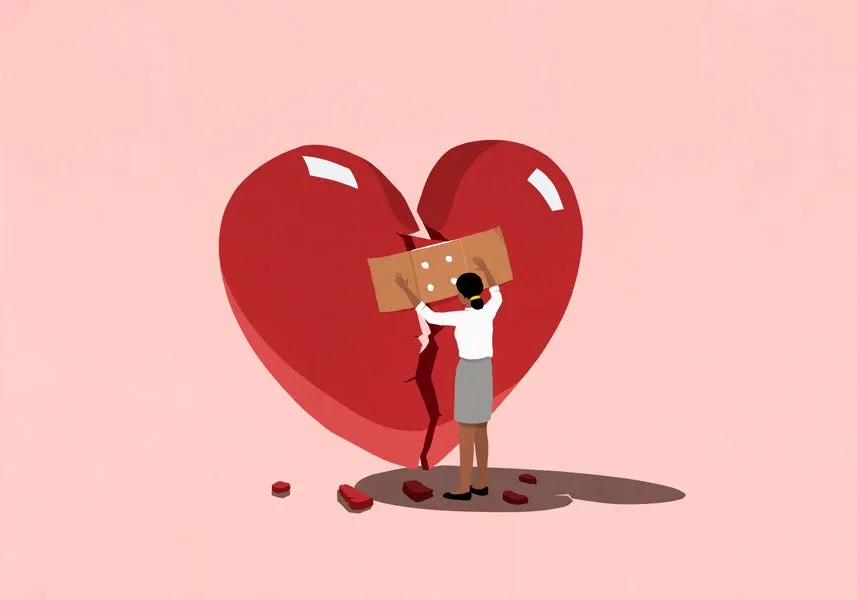"I can't live without them" is a common sentiment many individuals share right after a breakup. For many, moving on from an ex follows a tumultuous personal trajectory. It's easier to let go of your partner if you emotionally checked out during the relationship, but it's more challenging when you're the one trying to save it.
A 2025 study published in Social Psychological and Personality Science investigated whether emotional attachment disappears after romantic breakups. In the study of 320 participants, researchers discovered that such bonds dissolved over time for the majority, with roughly 4 years being cited as the mid point. This means that for the average person, it can take as long as 8 years to truly move on from an ex.
These results were heavily influenced by a participant's attachment style and how frequently they stayed in touch with their ex. "Even if the typical person does eventually 'get over' their former partner, for some people, remnants of those bonds continue and never fully fade away," the researchers explain.
If you're wondering where you might be in this journey, here are three signs that can confirm you are finally ready to move on.
One of the first signs of recovery from a breakup is when you stop asking yourself, "If we were still together, what could our future have looked like?" That means no more daydreaming about someone who is no longer in your life or staying up late, scrolling through old photographs and messages, imagining scenarios that will never come true.
This means you've stopped holding on to the hope that they might come back. It's a sign that you're accepting reality -- something that may feel painful at first but eventually brings clarity.
You no longer view your relationship or your ex through rose-tinted glasses. Instead, you see things as they really were; not as perfect, but as a mix of bittersweet experiences.
A 2021 exploratory phenomenological study published in the Journal of Psychology and Theology aimed to understand how people psychologically and spiritually process romantic heartbreak.
The researchers interviewed eight Caucasian adult women and found that participants followed a rough trajectory across five themes: relational evolution, decline, end, rumination and recovery. The type of rumination they engaged in made the biggest difference in their ability to move on. These included:
- When you look back at your relationships and see them with clarity, without the haze of hurt and pain, you know you're starting to move on to the next chapter of your life.
- When you no longer wonder, "Would they like this movie?" or "Should I tell them about this?" Instead, you think: "What do I want to watch? What's good for me?" Your mental energy returns to self-focus, rather than them being your first thought in any situation.
- In a relationship, two individuals often function as a unit. After a breakup, it can be hard to find your footing because you're still wired to think of yourself with them, instinctively reaching out for that sense of togetherness. And when you find none, it stings.
- But in time, you learn to find yourself again without thinking of them first. A 2015 study published in Social Psychological and Personality Science sheds light on why this shift is more important than we might realize.
- Researchers found that emotional recovery after a breakup is closely linked to self-concept clarity, which is your ability to clearly define who you are outside of the relationship.
- Participants were randomly assigned to either a group that completed four in-depth self-assessment sessions over nine weeks or a group that only completed assessments at the beginning and end of that period.
- The group that participated more intensively in the research (i.e., talked, reflected and assessed themselves more often) showed greater emotional recovery. Specifically, they experienced:
"I would encourage a person who recently experienced a breakup to consider who he or she is apart from the relationship. If that person can reflect on the aspects of him- or herself that he or she may have neglected during the relationship but can now nurture once again, this might be particularly helpful," says Grace Larson, the lead researcher of the study from Northwestern University.
This shows that healing isn't just about time -- it's about rediscovering who you are without your ex. When your first thoughts are about you and not them, that's when you know you've truly moved on.
A sure sign of getting over your ex is faith in your future. Even if you're not dating yet, you can imagine being happy with someone else someday. You're open to new connections and growth.
You find your way back to your old routines, spend more time with friends who had slowly drifted away and find yourself engaging in old hobbies or picking up new ones. Your sense of progress and renewed friendships give you your sense of purpose back.
A 2024 study tracked participants over 8 years to examine both the long-term emotional costs and potential developmental benefits of early breakup experiences. They found that while unresolved or ongoing distress, especially across multiple breakups, can take a toll on mental health, early heartbreaks can also cultivate emotional growth and romantic maturity when processed reflectively.
This means moving on isn't about forgetting your past or what you've been through, but reflecting and creating meaning out of it, which creates space for better things to come. In such a headspace, you fully process that there is a long life ahead of you, one that's filled with endless possibilities.
When you realize, "I can, in fact, live without them," and the thought no longer brings pain but peace -- that's when you know you've truly moved on.
